A Comprehensive Analysis of Piaget's Cognitive Development Theory
VerifiedAdded on 2023/06/03
|9
|1721
|462
Essay
AI Summary
This essay provides an overview of Jean Piaget's theory of cognitive development, outlining the four stages: sensorimotor, preoperational, concrete operational, and formal operational. It explains the cognitive capabilities and understanding of the world that children develop at each stage. The essay also discusses the educational implications of Piaget's theory, emphasizing the importance of aligning the content with the learner's developmental level and providing opportunities for discovery learning and hands-on experiences. Furthermore, it addresses criticisms of Piaget's theory, noting that some research suggests he underestimated children's abilities and that cognitive development may not be uniform across all functions. The essay concludes by highlighting the importance of active participation in learning and providing a curriculum that encourages cognitive development through logical steps and concept understanding. Desklib offers this assignment solution and many other resources for students.
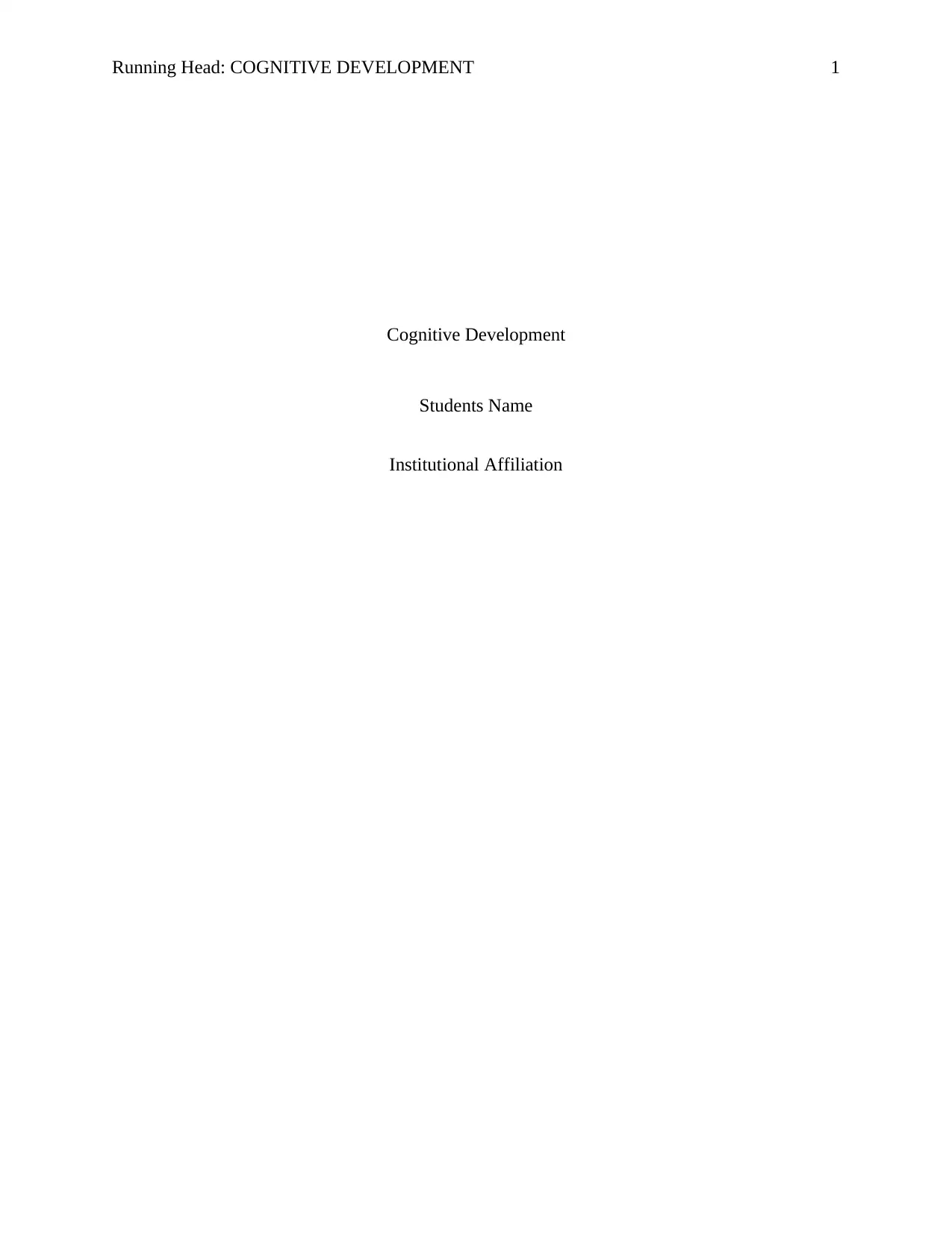
Running Head: COGNITIVE DEVELOPMENT 1
Cognitive Development
Students Name
Institutional Affiliation
Cognitive Development
Students Name
Institutional Affiliation
Paraphrase This Document
Need a fresh take? Get an instant paraphrase of this document with our AI Paraphraser
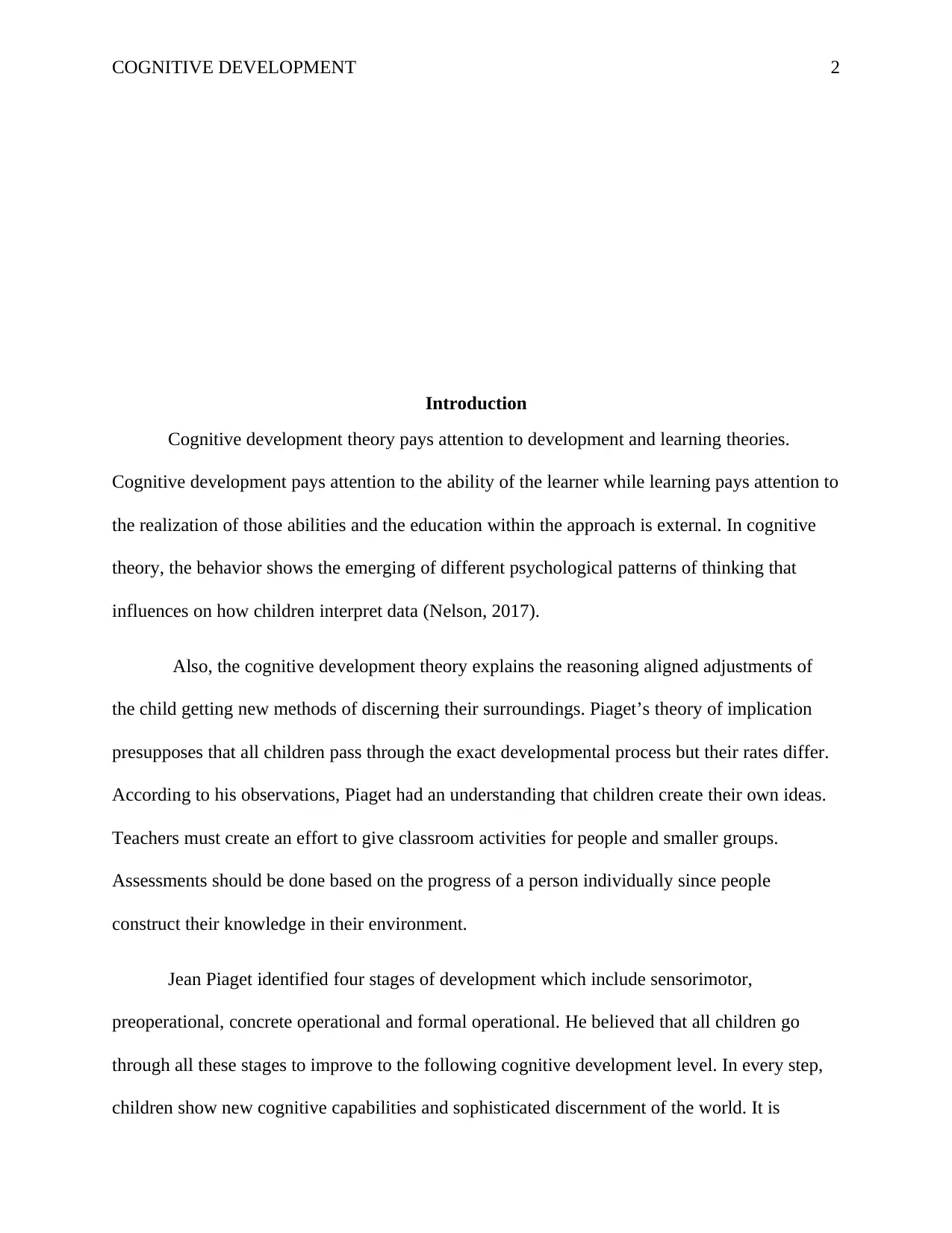
COGNITIVE DEVELOPMENT 2
Introduction
Cognitive development theory pays attention to development and learning theories.
Cognitive development pays attention to the ability of the learner while learning pays attention to
the realization of those abilities and the education within the approach is external. In cognitive
theory, the behavior shows the emerging of different psychological patterns of thinking that
influences on how children interpret data (Nelson, 2017).
Also, the cognitive development theory explains the reasoning aligned adjustments of
the child getting new methods of discerning their surroundings. Piaget’s theory of implication
presupposes that all children pass through the exact developmental process but their rates differ.
According to his observations, Piaget had an understanding that children create their own ideas.
Teachers must create an effort to give classroom activities for people and smaller groups.
Assessments should be done based on the progress of a person individually since people
construct their knowledge in their environment.
Jean Piaget identified four stages of development which include sensorimotor,
preoperational, concrete operational and formal operational. He believed that all children go
through all these stages to improve to the following cognitive development level. In every step,
children show new cognitive capabilities and sophisticated discernment of the world. It is
Introduction
Cognitive development theory pays attention to development and learning theories.
Cognitive development pays attention to the ability of the learner while learning pays attention to
the realization of those abilities and the education within the approach is external. In cognitive
theory, the behavior shows the emerging of different psychological patterns of thinking that
influences on how children interpret data (Nelson, 2017).
Also, the cognitive development theory explains the reasoning aligned adjustments of
the child getting new methods of discerning their surroundings. Piaget’s theory of implication
presupposes that all children pass through the exact developmental process but their rates differ.
According to his observations, Piaget had an understanding that children create their own ideas.
Teachers must create an effort to give classroom activities for people and smaller groups.
Assessments should be done based on the progress of a person individually since people
construct their knowledge in their environment.
Jean Piaget identified four stages of development which include sensorimotor,
preoperational, concrete operational and formal operational. He believed that all children go
through all these stages to improve to the following cognitive development level. In every step,
children show new cognitive capabilities and sophisticated discernment of the world. It is
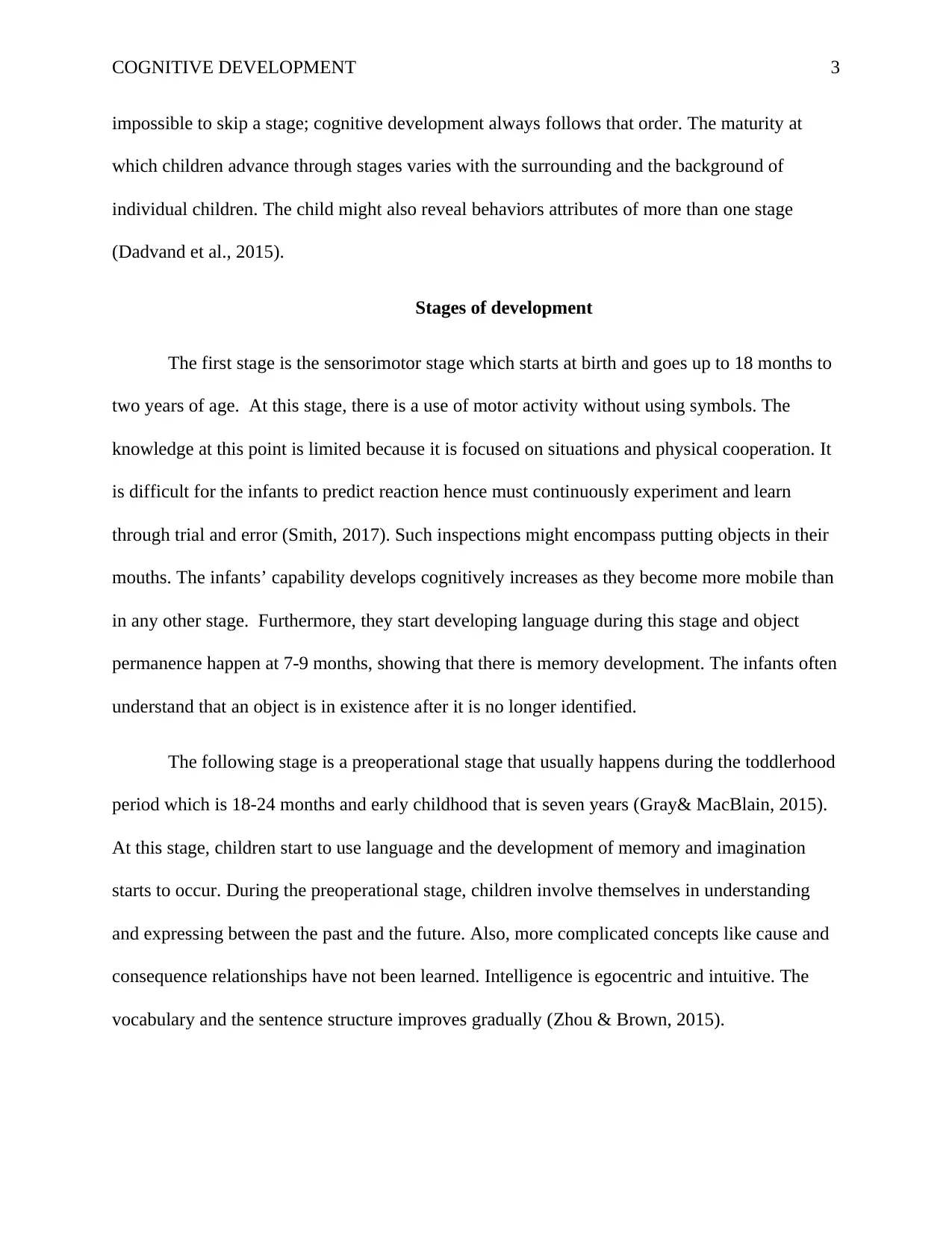
COGNITIVE DEVELOPMENT 3
impossible to skip a stage; cognitive development always follows that order. The maturity at
which children advance through stages varies with the surrounding and the background of
individual children. The child might also reveal behaviors attributes of more than one stage
(Dadvand et al., 2015).
Stages of development
The first stage is the sensorimotor stage which starts at birth and goes up to 18 months to
two years of age. At this stage, there is a use of motor activity without using symbols. The
knowledge at this point is limited because it is focused on situations and physical cooperation. It
is difficult for the infants to predict reaction hence must continuously experiment and learn
through trial and error (Smith, 2017). Such inspections might encompass putting objects in their
mouths. The infants’ capability develops cognitively increases as they become more mobile than
in any other stage. Furthermore, they start developing language during this stage and object
permanence happen at 7-9 months, showing that there is memory development. The infants often
understand that an object is in existence after it is no longer identified.
The following stage is a preoperational stage that usually happens during the toddlerhood
period which is 18-24 months and early childhood that is seven years (Gray& MacBlain, 2015).
At this stage, children start to use language and the development of memory and imagination
starts to occur. During the preoperational stage, children involve themselves in understanding
and expressing between the past and the future. Also, more complicated concepts like cause and
consequence relationships have not been learned. Intelligence is egocentric and intuitive. The
vocabulary and the sentence structure improves gradually (Zhou & Brown, 2015).
impossible to skip a stage; cognitive development always follows that order. The maturity at
which children advance through stages varies with the surrounding and the background of
individual children. The child might also reveal behaviors attributes of more than one stage
(Dadvand et al., 2015).
Stages of development
The first stage is the sensorimotor stage which starts at birth and goes up to 18 months to
two years of age. At this stage, there is a use of motor activity without using symbols. The
knowledge at this point is limited because it is focused on situations and physical cooperation. It
is difficult for the infants to predict reaction hence must continuously experiment and learn
through trial and error (Smith, 2017). Such inspections might encompass putting objects in their
mouths. The infants’ capability develops cognitively increases as they become more mobile than
in any other stage. Furthermore, they start developing language during this stage and object
permanence happen at 7-9 months, showing that there is memory development. The infants often
understand that an object is in existence after it is no longer identified.
The following stage is a preoperational stage that usually happens during the toddlerhood
period which is 18-24 months and early childhood that is seven years (Gray& MacBlain, 2015).
At this stage, children start to use language and the development of memory and imagination
starts to occur. During the preoperational stage, children involve themselves in understanding
and expressing between the past and the future. Also, more complicated concepts like cause and
consequence relationships have not been learned. Intelligence is egocentric and intuitive. The
vocabulary and the sentence structure improves gradually (Zhou & Brown, 2015).
⊘ This is a preview!⊘
Do you want full access?
Subscribe today to unlock all pages.

Trusted by 1+ million students worldwide
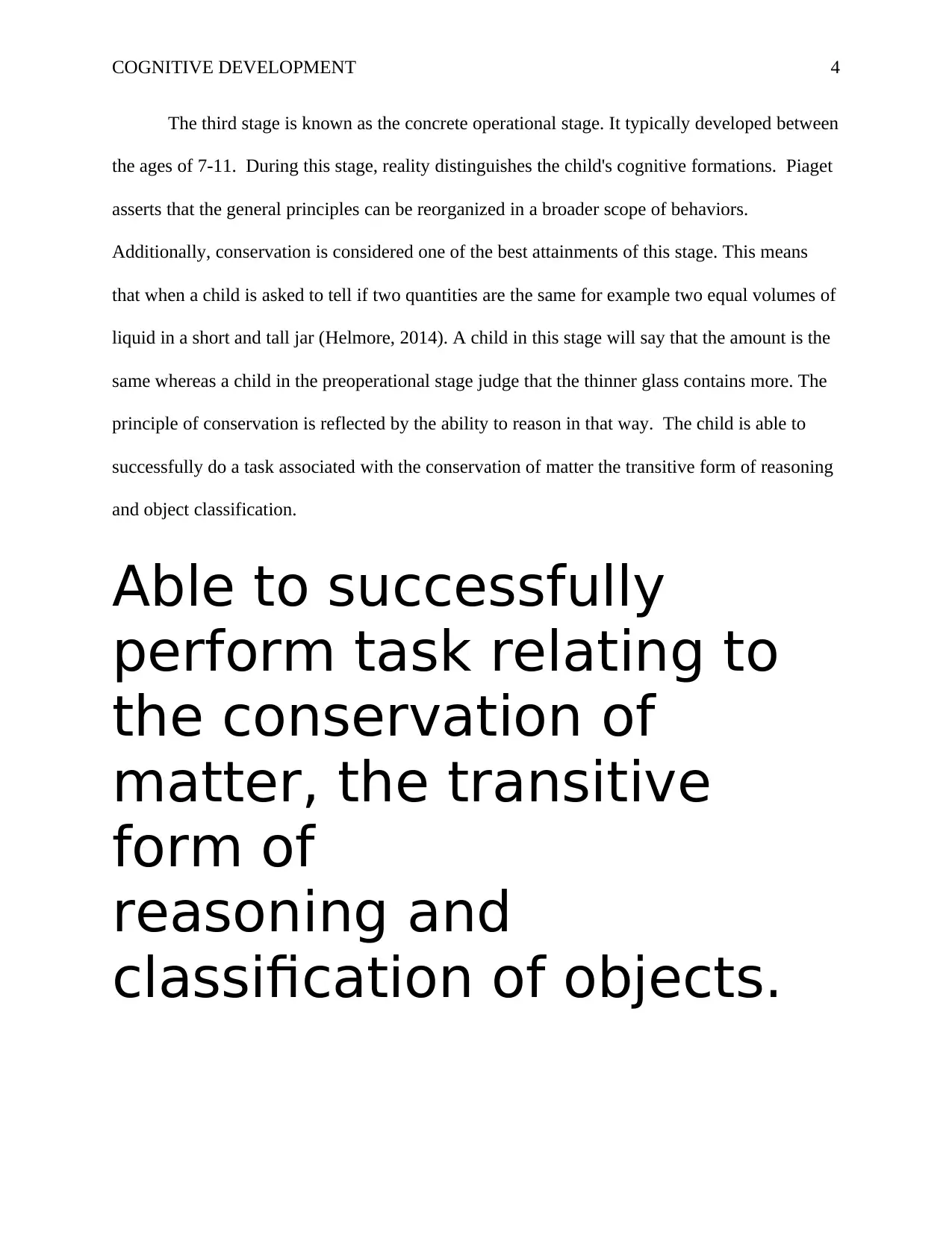
COGNITIVE DEVELOPMENT 4
The third stage is known as the concrete operational stage. It typically developed between
the ages of 7-11. During this stage, reality distinguishes the child's cognitive formations. Piaget
asserts that the general principles can be reorganized in a broader scope of behaviors.
Additionally, conservation is considered one of the best attainments of this stage. This means
that when a child is asked to tell if two quantities are the same for example two equal volumes of
liquid in a short and tall jar (Helmore, 2014). A child in this stage will say that the amount is the
same whereas a child in the preoperational stage judge that the thinner glass contains more. The
principle of conservation is reflected by the ability to reason in that way. The child is able to
successfully do a task associated with the conservation of matter the transitive form of reasoning
and object classification.
Able to successfully
perform task relating to
the conservation of
matter, the transitive
form of
reasoning and
classification of objects.
The third stage is known as the concrete operational stage. It typically developed between
the ages of 7-11. During this stage, reality distinguishes the child's cognitive formations. Piaget
asserts that the general principles can be reorganized in a broader scope of behaviors.
Additionally, conservation is considered one of the best attainments of this stage. This means
that when a child is asked to tell if two quantities are the same for example two equal volumes of
liquid in a short and tall jar (Helmore, 2014). A child in this stage will say that the amount is the
same whereas a child in the preoperational stage judge that the thinner glass contains more. The
principle of conservation is reflected by the ability to reason in that way. The child is able to
successfully do a task associated with the conservation of matter the transitive form of reasoning
and object classification.
Able to successfully
perform task relating to
the conservation of
matter, the transitive
form of
reasoning and
classification of objects.
Paraphrase This Document
Need a fresh take? Get an instant paraphrase of this document with our AI Paraphraser
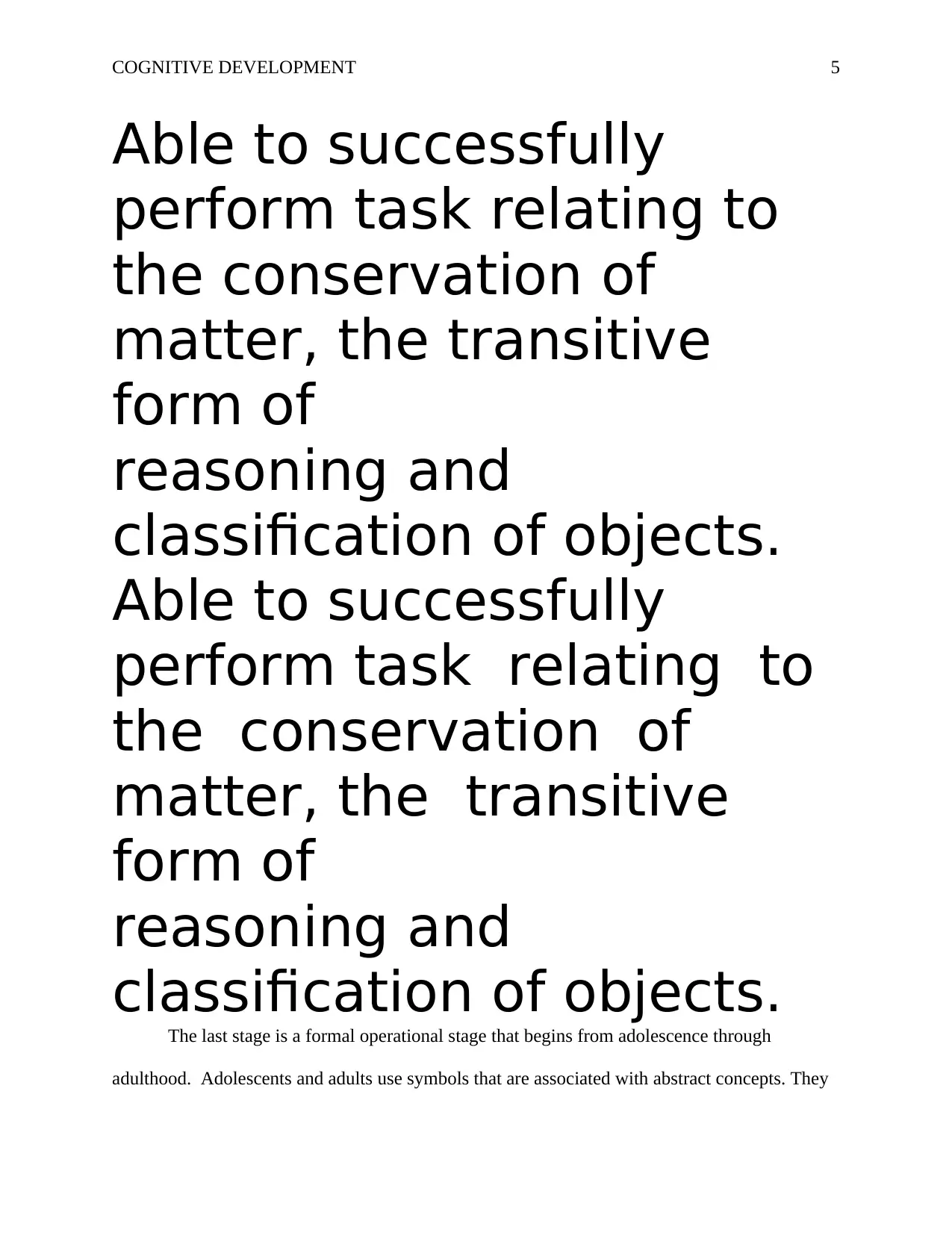
COGNITIVE DEVELOPMENT 5
Able to successfully
perform task relating to
the conservation of
matter, the transitive
form of
reasoning and
classification of objects.
Able to successfully
perform task relating to
the conservation of
matter, the transitive
form of
reasoning and
classification of objects.
The last stage is a formal operational stage that begins from adolescence through
adulthood. Adolescents and adults use symbols that are associated with abstract concepts. They
Able to successfully
perform task relating to
the conservation of
matter, the transitive
form of
reasoning and
classification of objects.
Able to successfully
perform task relating to
the conservation of
matter, the transitive
form of
reasoning and
classification of objects.
The last stage is a formal operational stage that begins from adolescence through
adulthood. Adolescents and adults use symbols that are associated with abstract concepts. They
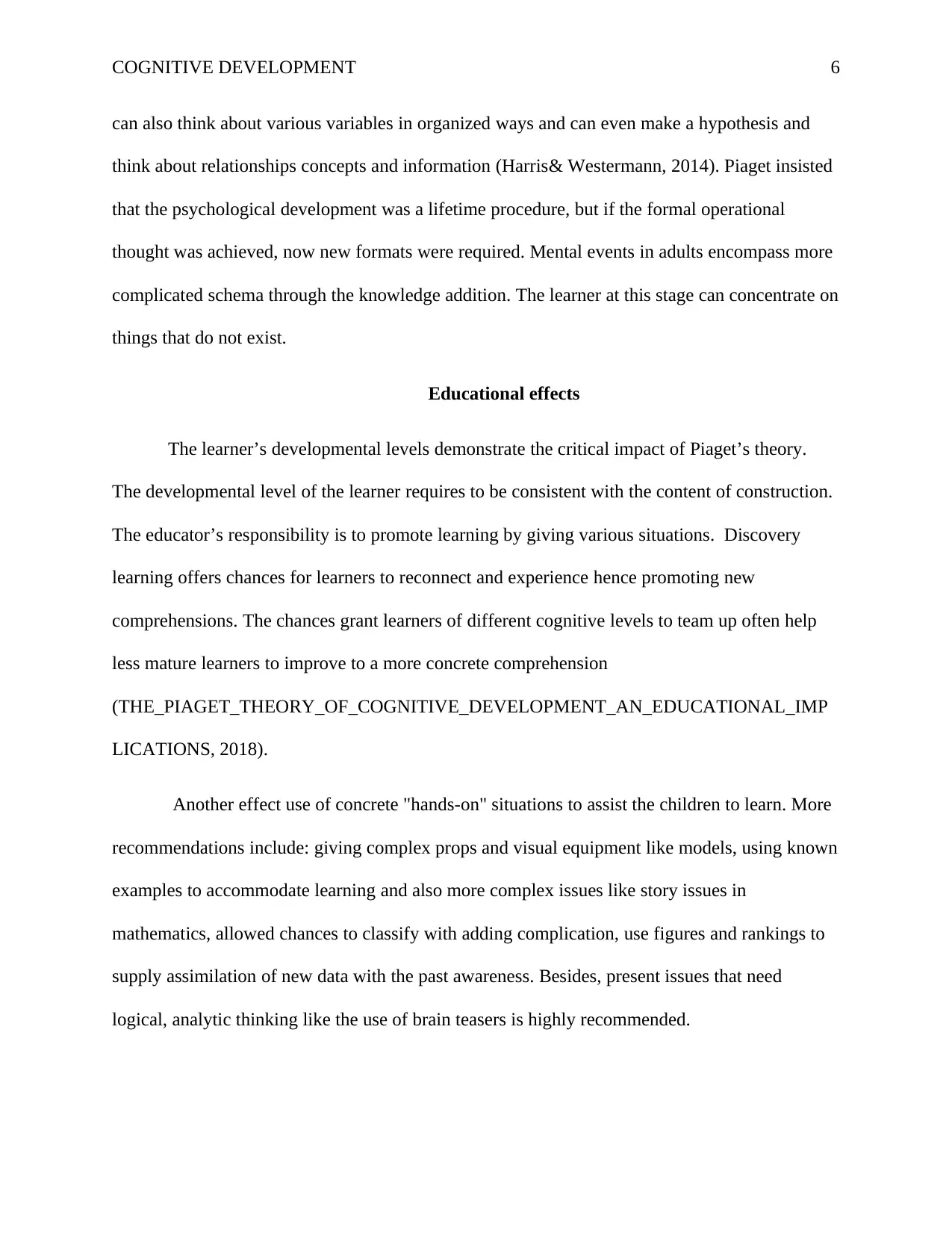
COGNITIVE DEVELOPMENT 6
can also think about various variables in organized ways and can even make a hypothesis and
think about relationships concepts and information (Harris& Westermann, 2014). Piaget insisted
that the psychological development was a lifetime procedure, but if the formal operational
thought was achieved, now new formats were required. Mental events in adults encompass more
complicated schema through the knowledge addition. The learner at this stage can concentrate on
things that do not exist.
Educational effects
The learner’s developmental levels demonstrate the critical impact of Piaget’s theory.
The developmental level of the learner requires to be consistent with the content of construction.
The educator’s responsibility is to promote learning by giving various situations. Discovery
learning offers chances for learners to reconnect and experience hence promoting new
comprehensions. The chances grant learners of different cognitive levels to team up often help
less mature learners to improve to a more concrete comprehension
(THE_PIAGET_THEORY_OF_COGNITIVE_DEVELOPMENT_AN_EDUCATIONAL_IMP
LICATIONS, 2018).
Another effect use of concrete "hands-on" situations to assist the children to learn. More
recommendations include: giving complex props and visual equipment like models, using known
examples to accommodate learning and also more complex issues like story issues in
mathematics, allowed chances to classify with adding complication, use figures and rankings to
supply assimilation of new data with the past awareness. Besides, present issues that need
logical, analytic thinking like the use of brain teasers is highly recommended.
can also think about various variables in organized ways and can even make a hypothesis and
think about relationships concepts and information (Harris& Westermann, 2014). Piaget insisted
that the psychological development was a lifetime procedure, but if the formal operational
thought was achieved, now new formats were required. Mental events in adults encompass more
complicated schema through the knowledge addition. The learner at this stage can concentrate on
things that do not exist.
Educational effects
The learner’s developmental levels demonstrate the critical impact of Piaget’s theory.
The developmental level of the learner requires to be consistent with the content of construction.
The educator’s responsibility is to promote learning by giving various situations. Discovery
learning offers chances for learners to reconnect and experience hence promoting new
comprehensions. The chances grant learners of different cognitive levels to team up often help
less mature learners to improve to a more concrete comprehension
(THE_PIAGET_THEORY_OF_COGNITIVE_DEVELOPMENT_AN_EDUCATIONAL_IMP
LICATIONS, 2018).
Another effect use of concrete "hands-on" situations to assist the children to learn. More
recommendations include: giving complex props and visual equipment like models, using known
examples to accommodate learning and also more complex issues like story issues in
mathematics, allowed chances to classify with adding complication, use figures and rankings to
supply assimilation of new data with the past awareness. Besides, present issues that need
logical, analytic thinking like the use of brain teasers is highly recommended.
⊘ This is a preview!⊘
Do you want full access?
Subscribe today to unlock all pages.

Trusted by 1+ million students worldwide
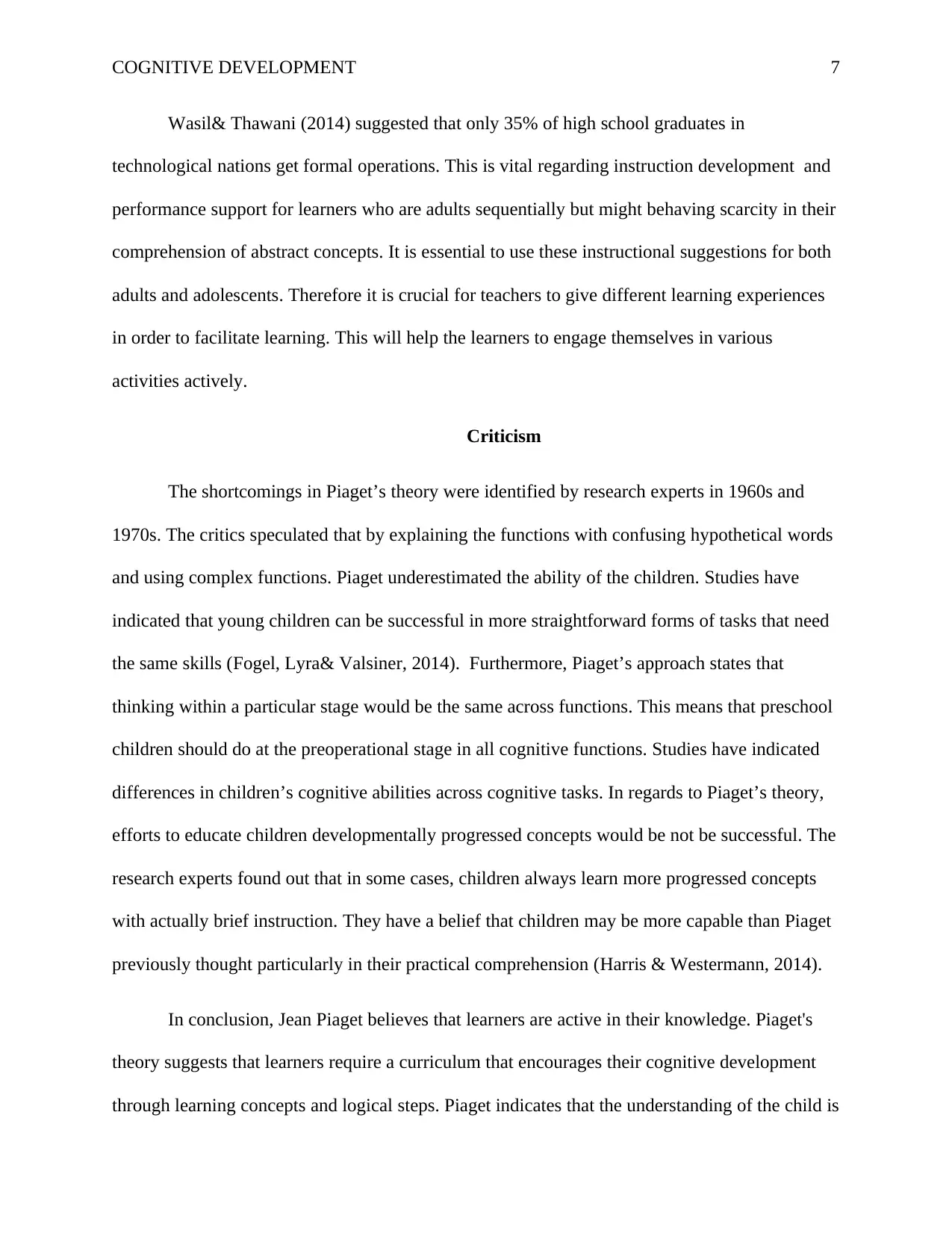
COGNITIVE DEVELOPMENT 7
Wasil& Thawani (2014) suggested that only 35% of high school graduates in
technological nations get formal operations. This is vital regarding instruction development and
performance support for learners who are adults sequentially but might behaving scarcity in their
comprehension of abstract concepts. It is essential to use these instructional suggestions for both
adults and adolescents. Therefore it is crucial for teachers to give different learning experiences
in order to facilitate learning. This will help the learners to engage themselves in various
activities actively.
Criticism
The shortcomings in Piaget’s theory were identified by research experts in 1960s and
1970s. The critics speculated that by explaining the functions with confusing hypothetical words
and using complex functions. Piaget underestimated the ability of the children. Studies have
indicated that young children can be successful in more straightforward forms of tasks that need
the same skills (Fogel, Lyra& Valsiner, 2014). Furthermore, Piaget’s approach states that
thinking within a particular stage would be the same across functions. This means that preschool
children should do at the preoperational stage in all cognitive functions. Studies have indicated
differences in children’s cognitive abilities across cognitive tasks. In regards to Piaget’s theory,
efforts to educate children developmentally progressed concepts would be not be successful. The
research experts found out that in some cases, children always learn more progressed concepts
with actually brief instruction. They have a belief that children may be more capable than Piaget
previously thought particularly in their practical comprehension (Harris & Westermann, 2014).
In conclusion, Jean Piaget believes that learners are active in their knowledge. Piaget's
theory suggests that learners require a curriculum that encourages their cognitive development
through learning concepts and logical steps. Piaget indicates that the understanding of the child is
Wasil& Thawani (2014) suggested that only 35% of high school graduates in
technological nations get formal operations. This is vital regarding instruction development and
performance support for learners who are adults sequentially but might behaving scarcity in their
comprehension of abstract concepts. It is essential to use these instructional suggestions for both
adults and adolescents. Therefore it is crucial for teachers to give different learning experiences
in order to facilitate learning. This will help the learners to engage themselves in various
activities actively.
Criticism
The shortcomings in Piaget’s theory were identified by research experts in 1960s and
1970s. The critics speculated that by explaining the functions with confusing hypothetical words
and using complex functions. Piaget underestimated the ability of the children. Studies have
indicated that young children can be successful in more straightforward forms of tasks that need
the same skills (Fogel, Lyra& Valsiner, 2014). Furthermore, Piaget’s approach states that
thinking within a particular stage would be the same across functions. This means that preschool
children should do at the preoperational stage in all cognitive functions. Studies have indicated
differences in children’s cognitive abilities across cognitive tasks. In regards to Piaget’s theory,
efforts to educate children developmentally progressed concepts would be not be successful. The
research experts found out that in some cases, children always learn more progressed concepts
with actually brief instruction. They have a belief that children may be more capable than Piaget
previously thought particularly in their practical comprehension (Harris & Westermann, 2014).
In conclusion, Jean Piaget believes that learners are active in their knowledge. Piaget's
theory suggests that learners require a curriculum that encourages their cognitive development
through learning concepts and logical steps. Piaget indicates that the understanding of the child is
Paraphrase This Document
Need a fresh take? Get an instant paraphrase of this document with our AI Paraphraser
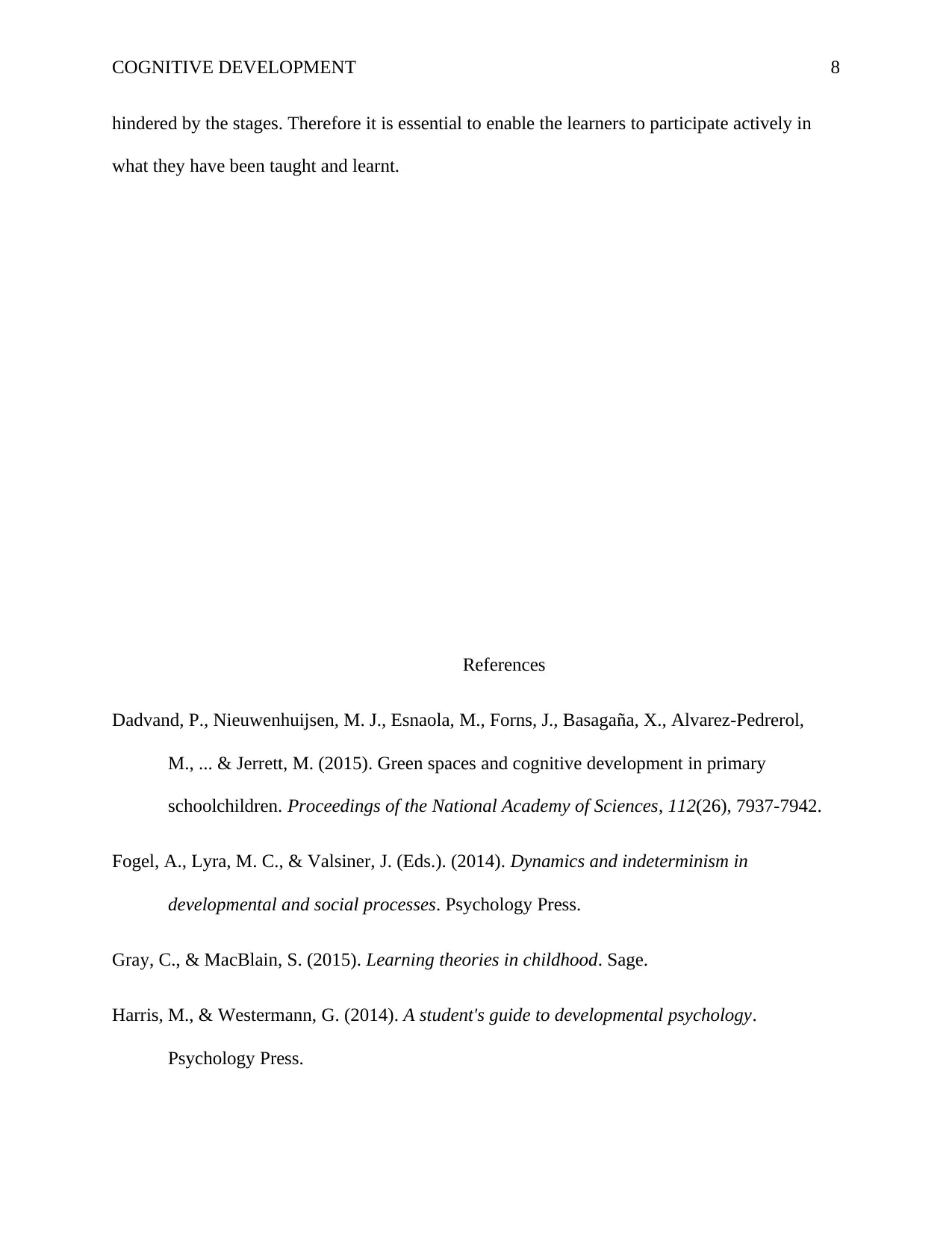
COGNITIVE DEVELOPMENT 8
hindered by the stages. Therefore it is essential to enable the learners to participate actively in
what they have been taught and learnt.
References
Dadvand, P., Nieuwenhuijsen, M. J., Esnaola, M., Forns, J., Basagaña, X., Alvarez-Pedrerol,
M., ... & Jerrett, M. (2015). Green spaces and cognitive development in primary
schoolchildren. Proceedings of the National Academy of Sciences, 112(26), 7937-7942.
Fogel, A., Lyra, M. C., & Valsiner, J. (Eds.). (2014). Dynamics and indeterminism in
developmental and social processes. Psychology Press.
Gray, C., & MacBlain, S. (2015). Learning theories in childhood. Sage.
Harris, M., & Westermann, G. (2014). A student's guide to developmental psychology.
Psychology Press.
hindered by the stages. Therefore it is essential to enable the learners to participate actively in
what they have been taught and learnt.
References
Dadvand, P., Nieuwenhuijsen, M. J., Esnaola, M., Forns, J., Basagaña, X., Alvarez-Pedrerol,
M., ... & Jerrett, M. (2015). Green spaces and cognitive development in primary
schoolchildren. Proceedings of the National Academy of Sciences, 112(26), 7937-7942.
Fogel, A., Lyra, M. C., & Valsiner, J. (Eds.). (2014). Dynamics and indeterminism in
developmental and social processes. Psychology Press.
Gray, C., & MacBlain, S. (2015). Learning theories in childhood. Sage.
Harris, M., & Westermann, G. (2014). A student's guide to developmental psychology.
Psychology Press.
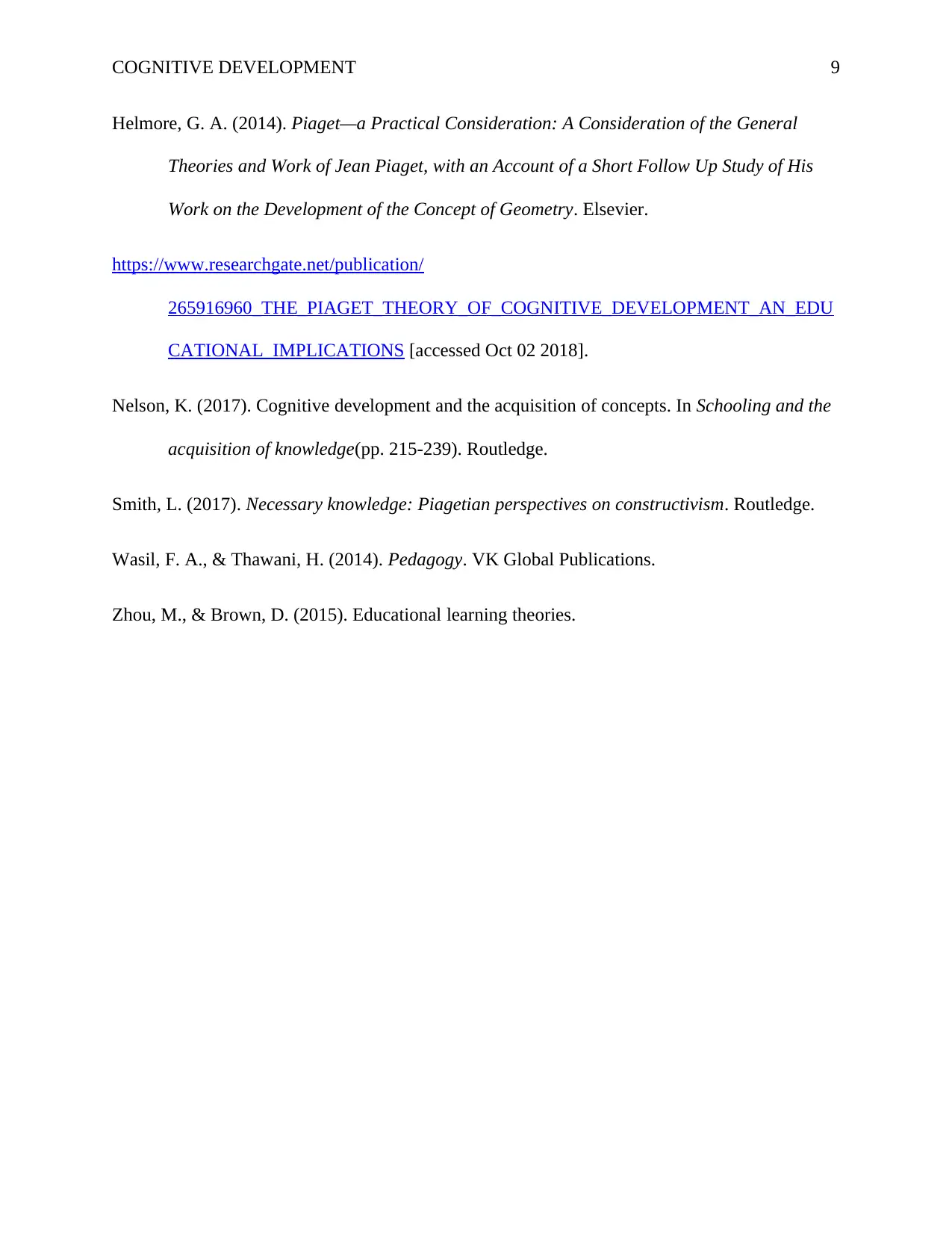
COGNITIVE DEVELOPMENT 9
Helmore, G. A. (2014). Piaget—a Practical Consideration: A Consideration of the General
Theories and Work of Jean Piaget, with an Account of a Short Follow Up Study of His
Work on the Development of the Concept of Geometry. Elsevier.
https://www.researchgate.net/publication/
265916960_THE_PIAGET_THEORY_OF_COGNITIVE_DEVELOPMENT_AN_EDU
CATIONAL_IMPLICATIONS [accessed Oct 02 2018].
Nelson, K. (2017). Cognitive development and the acquisition of concepts. In Schooling and the
acquisition of knowledge(pp. 215-239). Routledge.
Smith, L. (2017). Necessary knowledge: Piagetian perspectives on constructivism. Routledge.
Wasil, F. A., & Thawani, H. (2014). Pedagogy. VK Global Publications.
Zhou, M., & Brown, D. (2015). Educational learning theories.
Helmore, G. A. (2014). Piaget—a Practical Consideration: A Consideration of the General
Theories and Work of Jean Piaget, with an Account of a Short Follow Up Study of His
Work on the Development of the Concept of Geometry. Elsevier.
https://www.researchgate.net/publication/
265916960_THE_PIAGET_THEORY_OF_COGNITIVE_DEVELOPMENT_AN_EDU
CATIONAL_IMPLICATIONS [accessed Oct 02 2018].
Nelson, K. (2017). Cognitive development and the acquisition of concepts. In Schooling and the
acquisition of knowledge(pp. 215-239). Routledge.
Smith, L. (2017). Necessary knowledge: Piagetian perspectives on constructivism. Routledge.
Wasil, F. A., & Thawani, H. (2014). Pedagogy. VK Global Publications.
Zhou, M., & Brown, D. (2015). Educational learning theories.
⊘ This is a preview!⊘
Do you want full access?
Subscribe today to unlock all pages.

Trusted by 1+ million students worldwide
1 out of 9
Related Documents
Your All-in-One AI-Powered Toolkit for Academic Success.
+13062052269
info@desklib.com
Available 24*7 on WhatsApp / Email
![[object Object]](/_next/static/media/star-bottom.7253800d.svg)
Unlock your academic potential
Copyright © 2020–2026 A2Z Services. All Rights Reserved. Developed and managed by ZUCOL.





